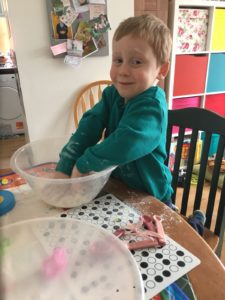

I make no excuses…I love the characteristics framework in the EYFS. I love it so much that I have a laminated copy of it in the back of my diary!! (along with a list of shoes to buy)
I love it’s focus on how children learn; how each little person is given the opportunity to shine, refine their problem solving skills & grow into a thinking, brave bundle of ideas, feeling & opinions.

If you ask any EYFS practitioner about the characteristics they would join in enthusiastically with me about the merits of the framework, discussing how a focus on it has supported children’s learning and generally nodding about its brilliance. It’s clear from its status in the EYFS Statutory Guidance and Development Matters documents the recognition of its vital place in enabling children to develop the skills to learn & access the subject knowledge required within the EYFS.
Why then do our colleagues in the rest of the school not really know about it? Admittedly as part of effective transition process from Reception to KS1 many practitioners do discuss the characteristics in terms of how Y1 provision needs to be organised to support children’s learning but I wonder how many similar conversations continue further up the school?
You may be thinking why do they need to know about it? Isn’t it just an EYFS thing that they do in Reception?
Let’s consider the framework in a bit more detail….
3 main elements: playing & exploring, (engagement) active learning (motivation) & creating & thinking critically (thinking). Notice the keywords in bold: they sum up the elements perfectly in the skills & attitudes children are developing.

Within each of these elements include further skills for practitioners to plan and include in experiences being offered to the children. These include; tasking a risk, persisting when challenges occur, finding ways to solve problems, changing strategy as needed & making links, making predictions and noticing patterns in their experiences.
Surely these are the kind of skills, attitudes and motivators that we want all of our children; regardless of which year group they are in and which challenging content they are currently exploring, to develop? All children deserve the opportunity to grow into a world where they are equipped and ready to cope with whatever life throws at them, secure in the knowledge that they have a bank of strategies ready to help them make sense of their situation. The answer to a problem may not come easy to them but the way to find it out will undoubtedly help them make sense of new information.
Research, particularly into metacognition and growth mindsets approaches, advocate for children to have a secure understanding of not only what they are learning (subject contact) but also how & why they are learning. Research has shown that children who have this understanding in metacognitive skills are able to tackle and immerse themselves fully in the curriculum. For example; the ReflectEd Metacognition project delivered by EEF & University of Manchester found that a focus on metacognition specific activities children on FSM made 4 Average Point Score (APS) of progress in maths and reading during the year as opposed to the 3 APS of progress made by FSM children in the other year 3 classes. https://educationendowmentfoundation.org.uk/projects-and-evaluation/projects/reflected-meta-cognition
I am currently leading a project with a group of fantastic and brilliant science leads. (none of them currently in EYFS). The project focuses on upskilling the science leads with how science is delivered in the EYFS so that provision can be planned all the way throughout EYFS, KS1 & KS2 ensuring a progressive skills based curriculum. Part of the CPD and network meetings have been to explore the characteristics framework, not only for the science leads to understand this, but also to consider what this means for their role when monitoring the quality of science provision in their own schools. I have been amazed by their willingness to throw themselves into the world of EYFS and whilst I made it clear that I didn’t want to convert them to Reception teachers (or secretly I may have done!) they have moved from being apprehensive on their first joint observation with me in their own Reception classes to now leading their own sessions with their new friends in Reception. The biggest impact for me has been that all of the science leads have now implemented elements of the framework into their own science policies; specifically inclusion of more active learning, investigative activities and a greater focus on children asking and researching their own key questions. An additional focus which has also come from this project has been for practitioners to consider their use of language in supporting the way that children learn. If we want all children to develop their language skills so they can use them in a variety of ways; for example, to show their understanding of key content and information, express their thoughts and beliefs about a particular problem or to organise their thinking, then it follows that adults need to model this themselves so children have a positive image of the potential of language. The impact of this focus for the science leads has been that these skills are now being developed progressively throughout their schools and a consistent approach to teaching and learning is starting to develop.
This is just my small scale research but shows me that it can be done & produce fantastic results.
Are there any others who have taken this approach? I would love to know…..
2 Replies to “What if we used the Characteristics……. everywhere?”